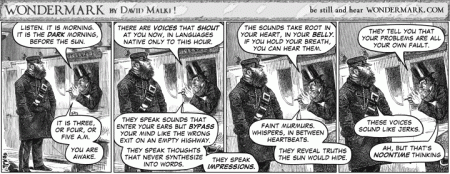(That’s the adjective /lúpàjn/; the noun referring to a flower in the pea family is /lúpǝn/ — but this is not the Lupine Express.)
Today’s morning name: the phrase the boy who cried Whorf. A paranomasic play — wolf vs. Whorf — on the boy who cried wolf, as in the Aesop fable, alluding to the Sapir-Whorf hypothesis on the relationship between language and thought.
Oh, I thought on coming to full consciousness, surely someone has messed Whorfianly with the formulaic phrase.
And so they had; here I’ve just picked the first one that came up in googling: the heading The boy who cried Whorf, in Anthropology for Dummies by Cameron M. Smith, p. 48.
Then I tried some other formulaic expressions (again picking just one occurrence, the first one to come before my eyes):


